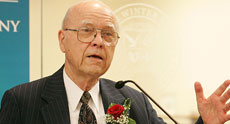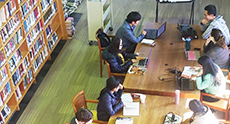Named one of the top 100 books of the Millennium by World Magazine, as the cover text indicates, testifies to the great influence this book has made on many people in the past century.
The new foreword by Carl Trueman gives a well readable and informed summary of Machen’s life and background as well as a short explanation of the Modernist-Fundamentalist-Battles out of which Machen wrote when turning a conference speech into this book.
In short, Machen shows how modern Liberalism and Christianity as religions are not merely two fruits from the same tree, but have completely different roots altogether. In their view toward doctrine, man, God, the scriptures, Christ, salvation, and the church Machen contrasts rhetorically and logically very effectively historic Christianity and modern Liberalism. Because of this style and the severity of the accusation made towards Liberalism by Machen, the book becomes partially even exciting to read.
However, it is his argued point, that not just in one, but in all points historic Christianity and modern Liberalism differ. Machen argues and structures his book following the categories given above. But throughout the book he brings out liberal doctrines and core beliefs in the contexts of the different categories showing how they influence the topic discussed in that chapter then moving on with his train of thought.
For the reader not deeply familiar with the specifics of the kind of liberalism he is referring to, a more structured representation of the doctrines of modern Liberalism by Machen would have been helpful. However, he is obviously first speaking and then writing to an informed audience of churchmen, who are familiar with topic, which renders this kind of overview unnecessary.
Concerning the cornerstone doctrines of modern Liberalism Machen notes:
Even though not listed together like this, Machen seems to identify these as the core modern, liberal presuppositions. He contrasts historical Christianity in every single of these points antithetically to conclude to have proven his opening statement that it is an entirely different religion.
Machen closes to argue, that as modern Liberalism and Christianity are antithetically different, both should go separate ways. Everything else would be dishonest. Also in his view, the Church needs to guard itself especially against false teachers within it, by making rigorous use of its historical creeds to remove, discipline, or at least prevent entry of liberal thought and ensure sound teaching and leadership of the Church.
Ample literature on the fundamentalism and the modernist-fundamentalist-battles exists originally listing Machen traditionally as a fundamentalist example. However, D. G. Hart suggested 1997 this view needs to be revised arguing, that Machen’s views can be better explained by his Presbyterian denominationalism and libertarian views connected to his general academic expertise and firm Christian values from his unique Southern family background.
One interesting note of this book is that on page 146 Machen states: “But the true way in which to examine a spiritual movement is in its logical relations; logic is the great dynamic, and the logical implications of any way of thinking are sooner or later certain to be worked out.” This seems to anticipate already the main theme of the works of Francis A. Schaeffer, at one time student of Machen and referring to Machen’s works in his own writing, that “ideas have consequences.”
This confirms that Machen was very maybe even strictly rational in his thinking and similar to Schaeffer starting from a faith’s basic doctrines determines the fruits that can be expected. In the case of Machen this is the incompatibility between historical Christianity and modern Liberalism. Schaeffer spoke about presuppositions and worldviews, but Machen actually describes the basic convictions of modern Liberalism according to his own judgment, as listed above, in a similar way.
Not just this, but actually the characteristics Machen stresses as most important for historical Christianity, namely its historicity and inerrant recording in all Biblical accounts including the supernatural, rational theism with a real existence of a personal God, and the original sinfulness of man are also stressed by Schaeffer as decisive in a Christian worldview. This reviewer thinks that actually in all points Machen ascribes to historical Christianity he agrees and identifies with them, so that looking at the picture Machen paints of Christianity, one can get a quite accurate picture of Machen’s own beliefs. This is probably true regardless, whether this picture actually describes Christianity exhaustively or not.
| Monday | 7:00 am – 8:00 pm PST |
|---|---|
| Tuesday | 7:00 am – 8:00 pm PST |
| Wednesday | 7:00 am – 5:00 pm PST |
| Thursday | 7:00 am – 8:00 pm PST |
| Friday | 7:00 am – 5:00 pm PST |
| Saturday | 8:00 am – 5:00 pm PST |
| Sunday | Closed |

Olivet University's Ralph D. Winter Library (RDWL) has evolved from a private collection of 5,000 books ...

Once a Library patron selects desired materials, he or she proceeds to check out these selections by submitting ...

The library has a rich collection of online information resources to support your academic research including ...

Gifts of books, materials and journals provide critical enhancements to the Library collections.